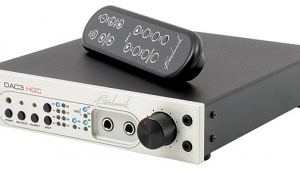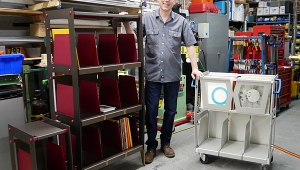| Columns Retired Columns & Blogs |
There's No Business Like the Hi-Fi Business Page 4
Don't be shy about charging your customers the maximum for installation work; no matter how much it is, the job will begin to be unprofitable after your third or fourth no-charge service call. When bidding installations, take your maximum markup on hardware, and figure labor at twice your hourly labor cost, per man. When I was doing lots of freelance installs, one rule of thumb that worked well for me was to "guesstimate" the amount of time a job would take, then tack on 50% for the unknown—for the rental of tools to penetrate impenetrable hidden reinforced concrete or for the necessary removal of an inexplicable cross-brace in a wall, and for countless trips to Radio Shack or the hardware store.
How much do you pay skilled installers? Whatever highly skilled construction trades are making in your area, plus some. If journeyman carpenters are making $20 an hour, $25 is not unreasonable. If you live in a college town or near an engineering school, you might be able to recruit students for as low as $10/hour. But remember: less is not better, and engineering students are not the tool-wielding, no-challenge-too-tough types they used to be. When hiring workers, you get what you pay for, and if you can't afford to pay people what they're worth, you can't afford to be in business.
Silent service
Another unpleasant reality, one so unpleasant it's usually passed over in silence, is the reliability, or lack of it, of the products you sell, and the necessity of repairing them. Quality control in the production of high-end audio gear ranges from exemplary to nonexistent. Problems may be minor, such as a loose jack on the back of a preamp; or major, like an entire production run of amplifiers whose output devices fail within the first 30 hours. You need an effective way to deal with such contingencies. That means a service department. In small shops, a salesman with a little technical ability can handle minor emergencies, and ship major ones back to the manufacturers. But if you're doing any real volume of business, you're going to need a service department of some kind, even if it's only one part-time technician, who in turn is going to need a space to work.
Finding good technicians is even more difficult than finding installers. There are almost no schools one can attend to learn the servicing of audio electronics. The instant tech schools who advertise on late-night TV specialize in turning poorly paid broom-pushers into poorly paid board-swappers for the computer industry. If you advertise for a technician, you'll be flooded by applications from recent graduates of such schools. If you hire one, you'll regret the day you duped yourself into turning one of these guys loose on your customers' treasured hi-fi components. The only thing worse for customer relations than selling a defective product is botching a repair.
The best advice I can give you about finding a technician is to circulate a rumor that you're looking for one, then let him find you. Good audio technicians—as rare as the proverbial hen's teeth—tend to be highly skilled, idiosyncratic, moody, opinionated, asocial, semi-intellectual types with almost no ambition. A few are willing to do double duty as installers, but many lack the necessary physical robustness. If you're lucky enough to land a good one, take him in and nurture him; forgive him his mood swings, his three-hour lunches and four-hour workdays, because when he settles down at his workbench he's going to save your ass.
Big Hint #1: Don't take in portables, car stereos, or antiques. Politely direct their owners elsewhere.
Big Hint #2: Forget about turning your service department into a "profit center," because the very best you can hope for it is break-even. (The scuttlebutt at Pacific Stereo was that, at its most profitable, its entire service operation ran on a 1% profit margin.) Your service department isn't there to generate revenue; it's there to support sales. A good service shop is a cost of doing business; it's public relations. If you lose a little bit but make your customers happy, you're way ahead of the game. If you make one of them happy, his wife may be the only one who hears about it, but he'll come back. If you make him unhappy, he'll tell everyone he knows; he'll stay away and so will they.
Manufacturers have differing attitudes and procedures for dealing with defective products. Some will go to almost any length to take care of their customers, to the point of replacing inoperable gear with new, no questions asked. Every once in a while, in Stereophile's "Letters" department, you'll read evidence of this—an audiophile raving about the new amplifier he was given absolutely free when he sent his old one in to be repaired. Such letters are not fiction. Miracles really do happen—in some obscure corners of this planet, "concern for the customer" is not a hollow slogan. Companies who go the extra distance to support their dealers and take care of their customers enjoy incredible loyalty and steady business. What a lovely world we might live in were this the rule rather than the exception.
- Log in or register to post comments




































